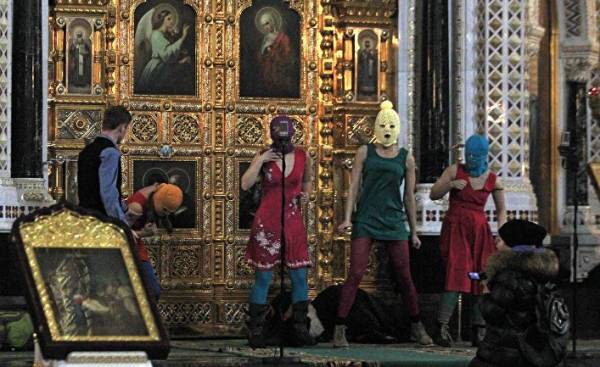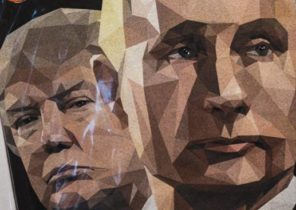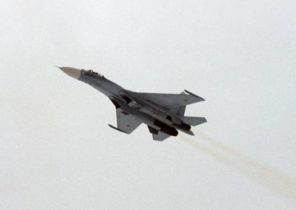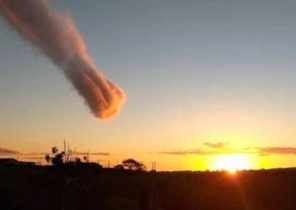
On 21 February 2012, five brightly dressed member of the Russian feminist punk band Pussy Riot broke into Moscow’s Cathedral of Christ the Savior, to serve at his altar to protest against the ties between the Russian Orthodox Church and its “chief Saint” — Russian President Vladimir Putin. “Virgin, Putin put” — shouted the activists, whose faces were hidden by balaclavas (which was a characteristic part of the image groups).
This “punk prayer” was both a political and feminist statement. Six months later, the judge sentenced three of the girls to two years of imprisonment (one, however, quickly released) by emphatically far from the policy of charges of “hooliganism motivated by religious hatred”.
Now, five years later, additional shadow over Russia’s relations with all the more removed from it by the West have rejected the involvement of Russia to the crises in Syria and Ukraine. West. In 2015, approximately 500 metres from the Kremlin walls was murdered opposition politician Boris Nemtsov.
However, although Russian society stifles attempts to challenge the political status quo, a relatively soft initiatives continue to exist.
“Artists just keep quiet, says the Russian curator and gallerist Marat Gelman, who left in early 2015 to Montenegro. — Now it is better not to say anything about politics, it is better to bypass these issues.”
The situation has changed dramatically compared to the times five years ago. “Despite the persecution of Pussy Riot, people were not afraid to defend them, — says gallery owner. — Then it was better.”
Now artists and curators are avoided, says the artist and feminist activist Michaela. First, it is “homosexuality… especially in adolescents”. Michaela recalls that in 2015, the authorities closed an exhibition about LGBT teenagers called “Be yourself” and questioned the gallery owner. “Secondly, it is a war in Ukraine, — she continues. — Finally, the third theme, which it is impossible to touch upon is Russian Orthodoxy.”
Marianna Muravyeva, a law Professor at the Moscow Higher school of Economics, believes that the major change in the legal field in addition to a complete failure of the government to human rights rhetoric became law on “propaganda of homosexuality” and “legislation against insulting the feelings of believers”.
The latter entered into force in July 2013. Since the Orthodox Church still managed to penetrate deeper into the public sphere. According to Muravyova, anti-religious practices of the Soviet Union generated a residual feeling of guilt toward the Church, and the Church now exploits this “capital”.
Michaela noted, “cultural expansion” of the Church, the manifestation of which was the emergence of a new Orthodox TV channels and radio stations and the opening of three new churches in its area.
Frequent attacks of Orthodox activists. In August 2015 they are affected exhibition in one of Moscow’s most famous art galleries. The organizers of the attack were found guilty of hooliganism and sentenced to a fine of 1,000 rubles (14 pounds at the current exchange rate).
“Any word written in old Church Slavonic font is spirituality, says Gelman. — Any work by a contemporary artist… this debauchery, sin and the influence of the West.”
Similar groups exist all over Russia, forcing the gallery to be safe. The participants of the attacks are acting on their own initiative, but believe that their activities are sanctioned by the state, said Muravyeva. Affect them “signals” from the government.
The result is a key factor for the artists is getting the idea. It tells Michaela, educational institutions and foreign funds often support and approve of the artists in words, but do not want to deal with the political work for fear of closure. Misunderstanding of where it crosses the “invisible line” that creates uncertainty. “This is self-censorship,” says the artist.
Artist and dissident Pyotr Pavlensky, at the end of 2013 arrived his scrotum to the cobblestones of red square (“Fixation”), and in 2015 podzhegshih the door of the FSB, in favor of individual action.
“Fixation” was dedicated to the feeling of helplessness that must be overcome in Russia, created the image of castration. “Pavlensky said, “Look, I’m even more poor than you”,” explains Gelman. The artist and his girlfriend Oksana Shalygina is now located in France. They try to get asylum there, as in Russia, they are accused of sexual violence.
Pavlensky is not the only one who uses the ability to single stocks. So, for example, enters Daria Serenko. She rides in the Moscow metro with political posters in the framework of “Peaceful picket”. On her poster from February 12, was a picture of a girl covering his head with his hands, defending himself from the remarks, which he usually hears when a woman says about rape (“Oh, she probably was drunk?” “How was she dressed?”).
Speaking alone in public space, Serenko is faced with hostility. “Men, as always, laughing,” she said in Facebook. Earlier this month, an anonymous group of artists pasted on located in the southwestern part of Siberia city of Omsk images of plants with lyrics against domestic violence.
This action was tied to Putin signed on 7 February a law on the decriminalization of domestic violence, which have caused “minor health damage”. All women in the act are not mentioned, in fact, he, according to Muravyova, suggests that women have to “cope” — and it’s too dangerous.
On January 27, when the Russian Parliament passed the law in the final reading, Pro-Kremlin tabloid Life published a video titled “Beats — means, loves” showing how to inflict pain without leaving marks.
Increase public awareness contributes to the spread of the Internet. Since the “Punk prayer”, the proportion of Internet users in Russia grew strongly. According to the annual reports of Freedom House, in 2011 the Internet was used by 33% of Russians, and in 2016 — already 73%. Power simultaneously tightened over the Internet control. In particular, they began to pursue social media users, using laws against “extremism” with extremely vague statements.
Last July the Internet has spread the hashtag #Aboussafy. Women posted stories about their sexual abuse. Russian organization of “Sisters”, which provides survivors of sexual violence psychological support, receives every year the “250-350” crisis calls.
The organization says that over the past year because of this hashtag, the number of appeals has increased. In addition, these new media platforms like Meduza and Wonderzine, also showing “social consciousness”. Before “we were the only community on LiveJournal,” says Michaela.
A variety of initiatives from the bottom are partly connected with the change of generations. “Before, nobody was worried, explains Muraviev. — Those children born after 1995… they were born in a very free society — they don’t know what it means to be afraid, they are not familiar with self-censorship, do not understand, how serious is the fear of the state.”
Aliide Naylor is a British journalist, former editor of the culture Department of The Moscow Times.







